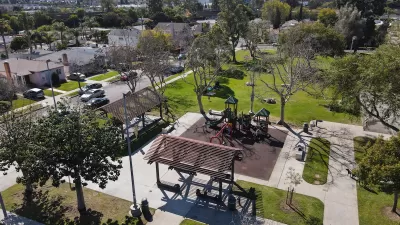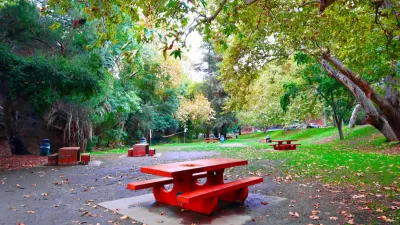Researchers used a machine learning algorithm to analyze over 200 parks in Philadelphia, revealing insights about differences in access to quality parks.

According to a new study from the University of Delaware, park access and quality vary across the city of Philadelphia. Using a machine learning algorithm to analyze 285 parks from over 100,000 park reviews gathered from Google Maps, the study shows that a majority of the parks that are considered to be of high quality are located in areas that are more likely have more affluent, white, and college educated residents. The parks that scored the lowest tend to be in areas where the residents are historically marginalized, including mostly low-income, Black and Latino, with a lower level of educational attainment.
As reported by Adam Thomas, the researchers corroborated the reviews with the physical characteristics of those parks using satellite and aerial imagery, as well as police reports and data from the Philadelphia Parks and Recreation Department. The study was published in Scientific Reports and was led by Matthew Walter, a doctoral student at the University of Delaware. Walter shared that by reading social media reviews of parks from 2011 to 2022 and by examining a large amount of reviews spread across a wide range of parks, he and his fellow researchers were able to see how a large population of Philadelphia was feeling about its urban parks.
Of particular concern to the researchers was that one key demographic group that lacked access to highly rated parks were the ones who needed them the most: young children. In the areas where the census data showed more young children, the park reviews were more likely to mention condition and safety when compared to other topics. This lower perceived park quality for young children raises a concern for childhood health and development.
FULL STORY: Study uses social media and machine learning to show environmental injustices in Philadelphia's urban parks

Planetizen Federal Action Tracker
A weekly monitor of how Trump’s orders and actions are impacting planners and planning in America.

San Francisco's School District Spent $105M To Build Affordable Housing for Teachers — And That's Just the Beginning
SFUSD joins a growing list of school districts using their land holdings to address housing affordability challenges faced by their own employees.

The Tiny, Adorable $7,000 Car Turning Japan Onto EVs
The single seat Mibot charges from a regular plug as quickly as an iPad, and is about half the price of an average EV.

As Trump Phases Out FEMA, Is It Time to Flee the Floodplains?
With less federal funding available for disaster relief efforts, the need to relocate at-risk communities is more urgent than ever.

With Protected Lanes, 460% More People Commute by Bike
For those needing more ammo, more data proving what we already knew is here.

In More Metros Than You’d Think, Suburbs are Now More Expensive Than the City
If you're moving to the burbs to save on square footage, data shows you should think again.
Urban Design for Planners 1: Software Tools
This six-course series explores essential urban design concepts using open source software and equips planners with the tools they need to participate fully in the urban design process.
Planning for Universal Design
Learn the tools for implementing Universal Design in planning regulations.
Smith Gee Studio
City of Charlotte
City of Camden Redevelopment Agency
City of Astoria
Transportation Research & Education Center (TREC) at Portland State University
US High Speed Rail Association
City of Camden Redevelopment Agency
Municipality of Princeton (NJ)





























